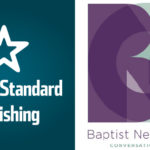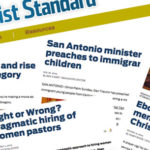In fact, a reader recently sent me a letter talking about the "liberal" Baptist Standard. I thought you might appreciate reading what he had to say and my reply. So, here you go. …
First, the letter
I read your editorial about the declining conditions in our convention, and this regret is shared by me. I wanted to kindly express some thoughts that might be helpful. I have wanted to commiserate with someone, close to my age, who went through the bitter split in the SBC that left many of us out in the cold. I am not a fundamentalist, but I am a conservative-moderate, whatever that means. I really do not know if the Baptist Standard mirrors the thinking of the BGCT?
My concern is that the Baptist Standard seems to have adopted the liberal view by featuring only articles written by liberals, or those with no political leanings. The only thing with conservative views is in the comments section. I have loved and enjoyed the Baptist Standard for 50 years, but I enjoy less with each issue. The recent elections showed that the majority of voting Americans are rejecting liberal policies. With this trend, the Standard, like the liberal media could find themselves irrelevant and become extinct.
I came from a family who voted Democrat, and I voted that way in two presidential elections. Here is where my former party has gone wrong, and changed from what my family supported.
Liberals in Christianity are usually liberal politically. The main area where they cause harm stems from their misunderstanding of the amendment regarding relations between the federal government and the public. They have inferred that it requires total separation between church and state in all situations, although the Constitution does not use the word “separation.” In addition, the Constitution does not pertain to what the individual states might do.
Supporting these distorted views places the Standard in the company of the ACLU and other socialist groups whose goals are weakening our nation and erasing God from the public sphere.
Liberals have many diverse ideas arising from the question, “What would Jesus do?“ They may say that any good-sounding thing is automatically what a Christian should do. Liberals think that conservatives are too hard-hearted, and conservatives think liberal ideas are squishy (and) sometimes conflict with common sense and Baptist practices. The word “liberal” sounds good on the surface, but their practices have been proven to keep people in poverty for generations, instead of teaching them how to rise above it.
The recent election shows that the majority voted against liberal principles and to return to the principles of our Founding Fathers. Republicans have had their problems, as when they also became big-spenders. They also must be held to higher standards. Liberals have painted themselves as more caring, but in reality, liberals have shown themselves less-generous in their personal giving than conservatives. They were happy to trade taxpayers’ money for votes from those who could not or would not provide for themselves.
Sign up for our weekly edition and get all our headlines in your inbox on Thursdays
It has been proven from history that true democracy cannot endure indefinitely. The cost of out-promising others to buy votes will eventually break the nation. Liberals voted for Barack Obama and influenced young and inexperienced people to elect the first black president, as if this would assuage any guilt about being racists. This mistake of the electorate has caused deep and irrecoverable damage to our nation.
If you think these thoughts have any validity, you might convey them to decision- makers, for the long-term interests of the Baptist Standard and Baptists in general. We should all be “Fair and Balanced,” as Fox News is. People detest the fact we have a state-controlled media instead of a free-press as America has always desired.
Next, my reply
Thanks for your letter. I’m grateful for your desire to communicate with me, even though it is apparent we don’t agree on all things, or at least you don’t agree with the diversity you see reflected in the Standard.
I wish to be neither defensive nor argumentative, so forgive me if either of those traits surface in my reply. Your letter raises accusations that call for a response, and I can’t respond without seeking to explain why the Standard is as it is and why I do what I do.
First, I’m a bit confused by your charges of “liberalism” with regard to the Standard. “Liberal,” “conservative” and other terms flew about during the “Baptist Battles” that divided the Southern Baptist Convention in the 1970 and ’80s and early ’90s and split the Baptist General Convention of Texas a dozen years ago. Those issues are past, and we have moved on. If you were to quantify the content of the Standard, you would see that the vast, vast majority of it focuses on the work and ministry of the churches, as well as the missions and ministry efforts of the BGCT and its agencies and institutions. We just don’t think about “liberal,” “conservative” and divisive politics when we edit the Standard.
You said we feature “only articles written by liberals, or those with no political leaning. The only thing with conservative views is in the comments section.” For our news, we either write the news ourselves (and neither Ken Camp, George Henson nor I are liberal) or utilize Religion News Service and Associated Baptist Press, both respected news organizations that seek to interview sources that represent the spectrum of opinion on the subject or development being covered. I edit the comments pages, and you noted conservative material appears there. I don’t evaluate the comments according to their place on a political spectrum, but rather whether they have something interesting to say that will make our readers think about the issues, whether or not they agree with the writer.
You implied that, somehow, the recent vote of the American people should dictate the Standard’s coverage or tone. If your logic were consistent, then two years ago, the Standard’s coverage should have tilted the opposite way you advocate. And you can be certain the leanings of the American voters two years from now will have much more to do with the state of the economy than with moral convictions about right and wrong or political philosophies about more or less government. So, your line of reasoning would set us up for inconsistent moral relativism that is unconscionable in a religion newspaper like ours.
In the most recent election, I voted for both Republicans and Democrats. I’m not partisan, and I vote for the candidate whom I perceive to have the strongest, most consistent character. I’d much prefer a mix of government leaders who are principled rather than partisan and who will be morally and intellectually consistent. Unfortunately, those people are in short supply today, particularly because the pull of both parties steers them toward short-term goals, such as re-election, rather than long-term goals, such as the good of the city, state or nation.
You stated you feel I am a “liberal” because of my views on the relationship between church and state. Actually, my views closely reflect several of my historic Baptist heroes:
· Thomas Helwys, one of the first two Baptists, who died in London’s Newgate Prison because he dared to tell King James I that God, and not a monarch, is Lord of the conscience.
· Roger Williams, founder of the first Baptist church in America, who also founded Rhode Island Colony as a sanctuary for people of all faiths (he pointedly included “Turks,” the term then used for Muslims) and even people of no faith. He consistently preached that, to be authentic, faith must be free and uncoerced.
· Obadiah Holmes, a colonial pastor who was imprisoned and beaten by the authorities in Massachusetts Bay Colony for refusing to register as a pastor and for ministering as a Baptist and not a Congregationalist.
· John Leland, a Virginia pastor who convinced James Madison to include the religion clause—“Congress shall make no law respecting an establishment of religion or prohibiting the free exercise thereof”—in the First Amendment.
· George W. Truett, pastor of First Baptist Church in Dallas for 47 years, who, in 1920, delivered from the steps of the U.S. Capitol the greatest speech on religious liberty ever uttered from human lips.
· James Dunn, executive director emeritus of the Baptist Joint Committee on Religious Liberty, who has dedicated his life to protecting religious liberty for all people and, as a corollary to that, preventing the unhealthy and corrupting intermingling of church and state.
I stand with these champions of religious liberty, and I am unmoved by claims of currently popular historical revisionists who seek to reinterpret our nation’s past to give Christianity hegemony over the consciences of all Americans. Do I wish every person were a Christian? Absolutely. Do I think Christianity should have special status in our nation? Absolutely not. In principle, this would violate the conscience of millions of people, which inherently is wrong. In practice, it would lead to the kinds of religious strife, and potentially even civil war, that has ripped apart other societies the world over.
One of the grave problems in America today is that partisan networks, such as Fox on the right and MSNBC on the left, and their radio counterparts have set the tone for public, much less political, discourse. Their adherents have come to think the only way to be “correct” is to be as partisan as they. So, someone who likes Fox thinks the Standard is too liberal, while someone who likes MSNBC thinks it is too conservative. Actually, we stand in line with historic, non-partisan free presses and the Baptist principle of honoring soul competency and the priesthood of all believers. Maybe this doesn’t fit the spirit of the times, and perhaps it has contributed to our circulation decline. However, my calling is to be true to my prayerful, Scripture-based assessment of God’s leadership and the historic Baptist distinctives I uphold. I much prefer that route than to seek approval of a fickle populace, which votes one way and, two years later, another, based primarily on that in which they place their trust—their economic well-being.
Well, this letter has gone much longer than I intended. But I wanted to respond carefully and faithfully to your concerns. I doubt I have changed your mind, but I hope I have given you a clear view into mine.














We seek to connect God’s story and God’s people around the world. To learn more about God’s story, click here.
Send comments and feedback to Eric Black, our editor. For comments to be published, please specify “letter to the editor.” Maximum length for publication is 300 words.